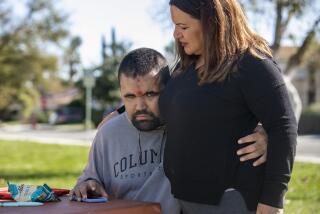What Dirty John reveals about domestic abuse
The Los Angeles Times series “Dirty John” tells the story of a grifter in Orange County who lied to and manipulated his wife.
John Meehan threatened Debra Newell’s family and isolated her from them. He told her he loved her, but called her names and said her kids were waiting for her to die so they could get her money. He was controlling, and watched her on video cameras he installed in their house.
Meehan was a con man and Newell his prey. But experts say their relationship is also an example of emotional abuse, a form of domestic violence that many women struggle to escape.
Emotional abuse can escalate to violence, but doesn’t always. Abusers instead control their partners with words.
The abuse, sometimes called coercive control, can be difficult to spot, both inside and outside the relationship. And when women realize they do want to leave, they might be scared their partners will hurt them. They might stay for financial security, to keep their family together, or for love.
Lisa Aronson Fontes, author of the book “Invisible Chains: Overcoming Coercive Control in Your Intimate Relationship,” said some women think they can make their partners act differently by changing their own behavior.
“If someone is just experiencing the coercive control and not physical violence then they may feel that they themselves are the problem,” Fontes said. “Many women would say, ‘I wish he could just hit me because then ... I would have a concrete reason to leave.’”
What does emotional abuse look like?
Domestic violence is any way to gain power over a partner, ranging from punching a spouse to poking holes in a condom to force a pregnancy. Emotional abuse is tricky, because it includes behaviors that are “often wrapped in a package of caring,” Fontes said.
A boyfriend might forbid his girlfriend from talking to certain people or going places, saying he’s worried other men will fall in love with her. He might read her emails or track her movements. If she doesn’t comply, he could threaten to take away access to her car or credit cards, or to withhold affection or inflict violence.
Some more examples:
- Threatening to physically harm you or your family
- Trying to isolate you from family or friends
- Refusing to trust you
- Attempting to control what you wear or eat
- Keeping you from leaving the house
- Monitoring where you go and whom you see
- Showing up unexpectedly in places, such as your workplace, when you didn’t want a visit
- Calling you names or humiliating you in public
- Saying you’d never find anyone better
- Destroying things that were important to you
- Keeping you from having your own money to use
The National Domestic Violence Hotline has a fuller list of the signs of various kinds of domestic abuse.
The abused are often walking on eggshells, afraid a small misstep could set off the abuser. They may, however, misinterpret the controlling behavior, experts say.
“Sometimes women think it’s a sign of love, but it’s a sign of control,” said Arlene Drake, a therapist who practices in West Los Angeles.
How common is it?
It’s difficult to know how many people are psychologically abused in the United States, in part because there are no laws that make such controlling behaviors illegal. The United Kingdom deemed “coercive and controlling behavior in an intimate relationship” a crime nearly two years ago, and there have been more than 200 convictions so far, according to Fontes.
Studies suggest emotional abuse is quite common. Physical abuse rarely happens without psychological abuse, and 1 in 3 women and 1 in 4 men is a victim of some form of physical violence by an intimate partner at least once in their life, according to the National Coalition Against Domestic Violence.
Psychological aggression is experienced more frequently and severely by women than men, according to a 2010 survey by the U.S. Centers for Disease Control and Prevention. But the survey still found that 48% of men and women had experienced at least one form of such aggression by an intimate partner at some time.
The behaviors most commonly reported included monitoring where partners went and calling them fat, ugly, crazy or stupid.
Why is it so hard to leave?
An abused woman will try to leave a relationship an average of seven times before she gets out for good, according to the National Domestic Violence Hotline.
Abusers often gaslight women, a tactic in which they make their victims question their own perception of reality. They tell them that something that happened didn’t actually happen, so the women don’t trust themselves.
They also deliberately destroy women’s self-esteem, so they feel like they couldn’t be OK on their own. Men might also try to make them experience guilt by saying they’ll commit suicide if the women leave.
“That gets women stuck, and not in a pleasant way,” said Kathleen Gray, a therapist in Los Angeles who has counseled domestic abuse survivors. “One of the things I would say to them is, ‘He’s going to keep casting that hook, but you’ve got to swim by.… Do not engage.’”
Gray said women may also feel as though they need a man to be accepted in society. Plus, women tend to feel responsible for making romantic relationships work, so they’re more likely to make concessions and hope the situation improves, she said.
What can you do if you’re worried about abuse?
Victims become increasingly isolated in these relationships, Fontes said.
“That’s why it’s so important to stay in touch with somebody ... and reflect back to them that they are a good person,” she said.
Victims should contact a domestic violence agency to get help. The National Domestic Violence Hotline offers phone counseling and online chatting. Loveisrespect is a similar resource targeted at teens where you can text, chat or message an advocate. RAINN, the Rape, Abuse & Incest National Network, also offers assistance.
Women in such relationships eventually realize that there is no placating an abuser, Drake said. She said that many women ignore their intuition because they fall in love or want the relationship to survive.
“We do that in hopes that things will be better when we marry them or live with them,” Drake said. “The truth is it doesn’t end up better, it just gets worse.”
Twitter: @skarlamangla
ALSO
Fearing deportation, many domestic violence victims are steering clear of police and courts
Domestic violence homicide rate drops with stricter gun law, study finds
For some Saudi women facing strict male authority and even abuse, there’s only one answer: Run
More to Read
Sign up for Essential California
The most important California stories and recommendations in your inbox every morning.
You may occasionally receive promotional content from the Los Angeles Times.











